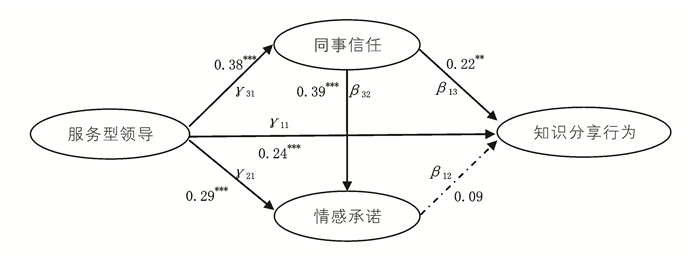全文HTML
-
无论是对教师个人还是学校而言,教师的知识分享行为均具有重要意义。就教师个人而言,知识分享是增长知识和提高能力的有效手段。通过与他人分享知识,个体教师可以有效地丰富自己的教学经验,实现自身专业素养的快速提升。同时,向他人分享自己的知识和体悟时,个体教师需要将这些知识和体悟转化成口头语言或书面材料的形式,这将有助于教师完善自身对教育教学的思考。就学校而言,教师之间的知识分享行为有利于提高学校的竞争力。这是因为分享教师知识不仅能有效预防因教学经验丰富的教师离职或退休而导致的知识流失问题,还能使教师的个人知识变为公共知识,实现组织知识的不断累积和教师个人知识的最大化利用,进而有助于学校形成竞争优势。尽管教师的知识分享行为被赋予了重要价值,但是长期形成的具有个人主义特征的专业文化以及知识作为一种稀缺资源能够给所有者带来各种有形及无形的好处,使得教师往往不愿主动将自己的知识分享给他人。因此,激励教师主动进行知识分享的行为具有重要的实践价值。
关于知识分享行为影响因素方面的研究,学界已进行了许多探讨。总体而言,影响组织成员进行知识分享的因素可分为组织特征和个体特征两类。服务型领导作为组织特征之一,其与知识分享行为的关系近年来受到了人们的关注。相关研究表明,上级的服务型领导风格与下属的知识分享行为之间存在密切的关系[1]。在影响组织成员进行知识分享的个体特征因素中,信任的重要作用已得到相关研究的证明,如郑仁伟和黎士群的研究表明同事信任对知识分享行为有正向影响效果[2]。情感承诺作为个体特征之一,其与知识分享行为的关系也被学界所关注。根据相关研究结果,认同组织的目标且愿意留下来工作的员工更倾向于将自己的知识分享给他人[3]。此外,还有研究探讨了服务型领导如何通过领导的信任影响知识分享行为[4]。
尽管在服务型领导与知识分享行为的关系方面,学界已经做了许多有益的探索,但是对前者如何通过内部作用机制来影响后者的探讨明显不足,尤其是同事信任和情感承诺在服务型领导和知识分享行为之间的中介效应鲜有检验。此外,在学校组织文化背景下,服务型领导与知识分享行为之间的关系尚未得到足够的关注。鉴于此,本文构建了服务型领导、教师同事信任、情感承诺和知识分享行为之间关系的整体理论模型,并以小学教师为被试,采集数据进行分析检验。本文的研究目的主要是考察小学校长的服务型领导对教师的知识分享行为有无显著影响,以及检验教师同事信任和情感承诺能否在服务型领导和知识分享行为之间的关系中发挥中介作用。
-
进入21世纪以来,人们对领导风格理论的兴趣逐渐增强。服务型领导因其在激励工作投入和促进组织创新方面有积极的作用,而受到人们较多的关注。服务型领导理论的提出者格林里夫(Greenleaf)认为,要成为服务型领导者,首先是服务者个人有想服务于他人且优先服务于他人的自觉意识,并且这样的选择会满足服务者个人渴望发挥其领导作用的愿望[5]。与其他类型的领导风格理论相比,服务型领导风格理论包含两个重要的独特因素:一是服务型领导者真正关注的是下属而不是组织目标;二是服务型领导者视自己为同侪中的首位者[6]。此外,服务型领导者不是运用权力来完成任务,而是通过对下属进行劝导说服并给予下属一定的自由来开展工作。关于服务型领导的维度构成,目前学界的看法不一。有学者认为服务型领导的特质是多维的,包括移情、倾听、察觉、情绪抚慰、说服、建立共同体和帮助下属成长等[7]。也有学者将服务型领导的特质分为7个维度,分别是概念化技巧、赋权、帮助下属成长和成功、下属利益优先、品德高尚、情绪抚慰和为社区创造价值[8]。还有学者将服务型领导分为利他主义、情绪抚慰、智慧、以理服人和组织管家等5个维度[9]。作为一种人本主义的领导方式,上级的服务型领导会对下属的工作态度、工作行为乃至组织的整体效能产生重要影响。
在知识经济时代,知识被认为是能够为组织提供竞争优势的战略性资产,知识管理的一个重要目标就是促进知识分享。所谓“知识分享”,指的是从一个人、一个团队或一个组织向另一个人、另一个团队或另一个组织转移或传播知识的行为[10]。目前,主要存在3种知识分享行为维度构成观点:第一种观点是将知识分享分为隐性知识分享和显性知识分享两个维度[10];第二种观点认为知识分享行为是由单向维度构成[11];第三种观点是将知识分享行为分为分享个人知识、分享学习机会和鼓励他人学习3个维度[2]。知识分享具有重要的意义,组织成员之间分享专业知识和技能的行为能够为互相学习提供机会,促进最佳工作实践经验的传播,降低不必要的学习成本,从个人和组织两个层面促进知识的创新和再利用,提升组织效能。
组织成员之间的知识分享行为往往不会自动发生,组织的领导者在促使下属进行知识分享方面扮演着重要的角色。在组织中,员工可以通过榜样人物的示范作用了解什么行为是被期望的、受奖励的或受惩罚的,组织的领导者就是起到了这类示范作用[12]。在班杜拉(Bandura)看来,人类几乎所有的来自直接经验的学习都可以在替代经验中发生,即通过观察他人行为及行为结果的方式学习[13]。然而,并不是所有的榜样都具有同等的影响力,那些拥有较高声望、有一定社会权力、能够对他人的行为进行奖励的榜样人物,其示范作用会更大[14]。这是因为组织的领导者拥有较高的地位,有权基于下属的行为结果对其进行奖励或惩罚,因此领导者的示范行为更容易受到下属的效仿。当上级甘心做下属的服务者时,上级的行为是以下属利益为导向的,容易引发下属的利他行为发生。知识分享行为就是属于利他行为中的一种。因此,可以这样说,上级的服务型领导容易激发下属从事知识分享活动。在此,本文提出如下假设:
H1:校长服务型领导对教师知识分享行为有显著的积极影响。
-
根据艾伦(Allen)和梅耶(Meyer)的观点,组织承诺由规范承诺、情感承诺和持续承诺3部分组成[15]。这3个部分可以这样区分:有强烈规范承诺的员工继续留在组织内工作是因为其认为应当这样做;有强烈情感承诺的员工继续留在组织内工作是因为其愿意这样做;有强烈持续承诺的员工继续留在组织内工作是因为其认为需要这样做。情感承诺被认为是预测组织成员工作状态与工作行为的一个有效因素。相关研究显示,情感承诺与离职倾向、退缩认知、离职行为、缺勤旷工等呈显著负相关关系,与工作绩效、组织公民行为呈显著正相关关系[15]。总体来讲,具有较高情感承诺的员工更容易相处,工作满意度更高,更具有工作效率,也更尽职尽责。
鉴于员工的组织承诺水平已成为影响组织成长的重要因素,因此激励员工有高度的组织承诺便成为了组织管理的重要内容。相关研究表明,领导风格是影响员工组织承诺的重要因素。例如:一项元分析研究显示,领导者的创意、领导者的体恤、领导者的沟通以及参与式领导是员工组织承诺的前因变量[16]。服务型领导风格理论所强调的服务型领导者是这样的上级:他/她将下属的利益放在自己的利益之前,为下属的成长提供机会,通过提供服务以促进下属潜能的充分发挥。显然,这种以人为中心、以下属为中心的态度,有助于在组织内形成一种安全的、紧密的人际关系[6]。而这种安全的、紧密的人际关系则有助于员工提高工作满意度,形成强烈的归属感,从而愿意留在组织内工作。因此,当小学校长把教师的专业成长当成学校的大事来抓,甘心做教师的服务者而不以领导者自居时,教师的情感承诺水平会显著提升。
员工的工作行为可分为角色内行为和角色外行为两类。与角色内行为相比,角色外行为是积极的、自主的,这类行为不会被工作要求所提前规定,不被正式的薪酬体系所认可,员工即使不做这种行为也不会受到处罚[17]。由于知识分享行为涉及个体的自愿付出,这种努力并不包含在劳动合同规定的职责范围,而且也没有明确的奖惩规定与之相对应,因此该类行为属于角色外行为。有学者指出,当连接个体、群体与组织的纽带是情感承诺时,员工会自愿付出努力,将自己的利益和组织的利益结合在一起,从而表现出更高水平的角色外行为[18]。此外,当组织中的个体将自己的知识分享给他人时,实际上是在为组织的知识库作贡献。鉴于组织的知识库可以被视为公共物品,因此组织的知识库也会遇到其他公共物品所遇到的同样的社会困境[19]。也就是说,个体倾向于采取机会主义行为,隐藏个人的知识,不对组织的知识库作贡献,并力图搭便车利用别人的贡献。要想降低个人隐藏知识的可能性,一个干预策略就是增加个体对组织的认同,即情感承诺[19]。以上分析表明,上级实行服务型领导有助于提升员工的情感承诺水平,而员工的情感承诺又是影响其参与知识分享的积极因素。因此,本文认为,服务型领导会通过情感承诺对知识分享行为产生显著的积极影响。在此,本文提出如下假设:
H2:教师情感承诺居间联系了校长服务型领导和教师知识分享行为的关系。
-
在对信任的众多定义中,梅耶(Mayer)等人的观点对目前的学界影响比较大。他们认为,信任是指信任者不管自己是否拥有监督或控制对方的能力,基于自己对对方抱有重要的特定行为的期望,而愿意使自己处于容易受到对方行为伤害的境况中[20]。信任的重要特点在于,尽管使自己处于易受伤害的境况中,信任者依然愿意承担风险。罗修(Rousseau)和希特金(Sitkin)通过分析关于信任的诸多定义后指出,信任的定义有两个关键之处,即有信心的期待和愿意处于易受伤害的境况中[21]。进而,他们提出了一个较宽泛的定义,认为信任是基于对对方行为或意图的积极预期,而愿意使自己暴露于易受伤害的境况中的心理状态。
在信任构成维度方面代表性的观点有:将人际信任分为情感性信任和认知性信任两个维度[22];将组织信任分为人际信任和系统信任两个维度[23];将组织信任划分为同事信任、主管信任和组织信任3个维度[24],等等。组织中的信任具有重要作用,能促进成员间的合作行为,减少组织内部有害的冲突,降低交易成本,有助于快速形成临时性的工作团队,以及提升组织应对危机的灵敏性等。
在信任的形成机制方面,服务型领导的作用受到了人们的关注。与变革型领导相比,服务型领导包含了道德成分,并把重点放在满足下属的需求上。相关研究表明,当上级实行服务型领导时,下属的公众服务动机会增强[1]。也就是说,服务型领导者能在组织内部营造一种服务他人的氛围,通过服务于下属,促进下属的成长。众所周知,组织成员之间的互相服务属于社会交换而不是经济交换。根据彼德·布劳(Peter Blau)的观点,社会交换会激发个体的责任感、感激和信任等情感[25]。因此,当上级实施服务型领导模式时,下属间的信任也会增强。
对于知识工作者来说,自愿将自己的专门知识分享给同事,可能会使自己的工作优势消失,甚至会带来威胁,因此知识拥有者只有在愿意承担风险,也就是在信任他人的情况下,才会将知识分享给他人[2]。另有学者指出,当一方不能确定另一方行为的道德基础或者不能确定另一方行为受何种价值观指导时,知识和信息不会被自由地交换[26]。只有当人们之间产生无条件的信任时,构成信任基础的共享价值观才会让个体确信知识和信息将被用于获得更多的益处,从而人们自愿分享知识和信息。显然,当知识拥有者信任同事时,他/她才愿意将自己的知识分享给对方,因为知识拥有者相信,同事不会滥用自己的知识,并且在未来当自己需要时,同事也会将其知识分享给自己。以上分析表明,上级实施服务型领导模式有利于提升下属对同事的信任,而教师同事信任是影响知识分享行为的重要因素。因此,服务型领导会通过教师同事信任对知识分享行为产生显著的积极影响。在此,本文提出如下假设:
H3:教师同事信任居间联系了校长服务型领导和教师知识分享行为的关系。
-
个体对某事物的态度是由个体对该事物具有某些特定属性的信念以及个体对这些属性的评价所决定的[27]。如果个体将某事物与积极的属性联系起来,那么个体会对该事物产生积极的态度。因此,当员工认为同事、领导者及组织值得信赖时,这种积极的信念会产生积极的态度,即达成组织承诺。信任是建立并维持良好人际关系的关键因素,当组织中存在高度的信任时,组织成员将彼此视为是有能力的、诚信的和友善的同事,他们会因此受到激励,产生对组织的依恋感,认同组织的目标和价值观,情感承诺水平会提升[28]。也就是说,教师同事信任对情感承诺有积极影响。前文的分析已表明,服务型领导是教师同事信任的积极预测变量,服务型领导会通过教师同事信任对情感承诺产生显著影响。据此,本文提出如下假设:
H4:教师同事信任居间联系了校长服务型领导和教师情感承诺的关系。
一. 服务型领导与知识分享行为
二. 情感承诺对服务型领导和知识分享行为之间关系的中介作用
三. 教师同事信任对服务型领导和知识分享行为关系的中介作用
四. 教师同事信任对服务型领导和情感承诺关系的中介作用
-
进行预测试。2017年9月,向山东省的泰安、济宁和日照地区4所小学教师发放纸质问卷100份,收回问卷100份,有效问卷79份,有效率为79%。
进行正式测试。同年10-11月,向山东省的泰安、淄博、临沂、济宁、菏泽、济南、德州等地区的12所小学教师发放纸质问卷300份,收回问卷300份,有效问卷248份,有效率为83%。正式测试的样本结构如表 1所示。
-
1.编制服务型领导量表
笔者从林顿(Liden)等学者开发的服务型领导量表中选取了11个题项,编制了校长服务型领导量表[8]。本量表的11个题项分别归入情感抚慰、下属利益优先、帮助下属成长和品行高尚4个维度。其中:情感抚慰维度包含3个题项,下属利益优先维度包含3个题项,帮助下属成长维度包含2个题项,品行高尚维度包含3个题项。典型的题项如“校长肯花时间单独和我沟通”等。在预测和正式测试中,量表的内部一致性系数分别为0.958和0.956。
2.编制教师同事信任量表
笔者从郑仁伟和黎士群开发的组织信任量表中选取了3个题项,编制了教师同事信任量表[2]。本量表是单维度量表。典型的题项如“我认为我的同事是值得信任的”等。在预测和正式测试中,本量表的内部一致性系数分别为0.871和0.893。
3.编制情感承诺量表
笔者从梅耶(Meyer)等学者编制的情感承诺量表中选取了5个题项,编制了教师情感承诺量表[29]。本量表是单维度量表。典型的题项如“我非常高兴在这所学校一直工作下去”等。在预测中,量表的内部一致性系数为0.803。因有一个题项与总体的相关性太低,故删去,保留了剩下的4个题项。在正式测试中,量表的内部一致性系数为0.906。
4.编制知识分享行为量表
笔者从辰纳莫尼尼(Chennamaneni)等学者开发的知识分享行为量表中选取了4个题项,编制了教师知识分享行为量表[11]。该量表是单维度量表。典型的题项如“我经常与同事分享我的教学经验”等。在预测和正式测试中,量表的内部一致性系数分别为0.949和0.938。
以上测量工具均采用Likert 7点量表格式,从“非常不同意”(1)到“非常同意”(7)。
一. 样本
二. 测量工具
-
收敛效度。利用正式测试数据分别对服务型领导、教师同事信任、情感承诺与知识分享行为等4个变量进行了验证性因素分析,检验结果见表 2。由表 2可知,4个模型的主要拟合指数均表现良好,表明4个变量均具有很好的收敛效度。
区分效度。为了检验4个变量的区分效度,利用正式测试数据分别对以下3个模型进行了检验。表 3中,模型A代表本文假设的四因子模型(将服务型领导、教师同事信任、情感承诺与知识分享行为视为4个独立的因子),模型B代表三因子模型(将教师同事信任与情感承诺合并为一个因子),模型C代表单因子模型(将服务型领导、教师同事信任、情感承诺与知识分享行为合并为一个因子)。3个模型对数据的拟合情况见表 3。由表 3可知,模型A对数据的拟合较好,另外两个模型对数据的拟合较差。因此,本文认为4个变量的区分效度良好。
-
表 4显示了本文所涉及的4个变量的均值、标准差与相关系数。由表 4可知,服务型领导、教师同事信任、情感承诺、知识分享行为的均值分别为5.382、6.117、5.857、6.121。数据表明,服务型领导、教师同事信任、情感承诺和知识分享行为均达到较高水平。相关分析结果显示:服务型领导与教师同事信任、情感承诺、知识分享行为均呈显著正相关关系;教师同事信任与情感承诺、知识分享行为均呈显著正相关关系;情感承诺与知识分享行为呈显著正相关关系。
-
本文使用结构方程模型对提出的假设进行了检验。根据巴伦(Baron)和肯尼(Kenny)的中介效应检验程序[30],本文首先考察了服务型领导对知识分享行为、教师同事信任和情感承诺的直接效应。检验结果显示,3个模型对数据的拟合较好,主要拟合指数见表 5。同时,服务型领导对其他3个变量的效应均达到显著性水平:对知识分享行为的效应为0.35(T=5.30,p<0.001),对教师同事信任的效应为0.36(T=5.36,p<0.001),对情感承诺的效应为0.43(T=6.25,p<0.001)。
以上分析表明,中介效应的前两个条件已经满足。接下来,本文对4个变量之间关系的整体理论模型进行检验。表 6中,模型A表示教师同事信任和情感承诺部分居间联系了服务型领导与知识分享行为之间的关系,模型B表示教师同事信任和情感承诺完全居间联系了服务型领导与知识分享行为之间的关系,模型C表示教师同事信任和情感承诺没有居间联系服务型领导与知识分享行为之间的关系。3个模型属于嵌套模型,因此可以直接比较其拟合优度。3个模型的主要拟合指数见表 6。由表 6可知,模型A在多个拟合指数上优于模型B。虽然模型B比模型A多了1个自由度,但是其χ2增加的部分大于6.63(α=0.01时χ2的临界值),这表明模型B对模型A的简化不可取。模型A也在多个拟合指数上优于模型C。尽管模型C比模型A多了2个自由度,但其χ2增加的部分大于9.21(α=0.01时χ2的临界值),这表明模型C对模型A的简化亦不可取。因此,本文将模型A作为最终模型。
图 1是小学校长服务型领导影响教师知识分享行为的整体结构模型,显示了标准化路径系数。由图 1可知:服务型领导对知识分享行为有显著的积极影响(γ11=0.24,p<0.001),对教师同事信任有显著的积极影响(γ31=0.38,p<0.001),对情感承诺有显著的积极影响(γ21=0.29,p<0.001);教师同事信任对知识分享行为有显著的积极影响(β13=0.22,p<0.01),对情感承诺有显著影响(β32=0.39,p<0.001);情感承诺对知识分享行为的影响不显著(β12=0.09,p>0.05)。经计算,教师同事信任对服务型领导和知识分享行为之间关系的中介效应为0.08(0.38×0.22),达到显著性水平(T=2.45,p<0.05);教师同事信任对服务型领导和情感承诺之间关系的中介效应为0.15(0.38×0.39),达显著性水平(T=4.12,p<0.001);情感承诺对服务型领导和知识分享行为之间关系的中介效应为0.03(0.29×0.09),达不到显著性水平(T=1.09,p>0.05)。以上分析表明,假设H2不成立,假设H1、H3、H4成立。
一. 效度分析
二. 变量的描述性统计与相关分析
三. 中介效应检验
-
已有的研究表明,在服务型领导与知识分享行为之间存在着密切的关系。但是这些研究对二者之间关系的探讨并不充分,尤其是前者影响后者的内在作用机理还缺乏深入的探究。本文建构了小学校长服务型领导通过教师同事信任和情感承诺作用于教师知识分享行为的整体理论模型,并进行了相应检验。
相关分析表明,校长服务型领导分别与教师知识分享行为、教师情感承诺和教师同事信任呈显著正相关关系;教师同事信任分别与教师情感承诺和教师知识分享行为呈显著正相关关系;教师情感承诺与教师知识分享行为呈显著正相关关系。中介效应检验表明,教师情感承诺对校长服务型领导与教师知识分享行为之间关系的中介效应不显著;教师同事信任在校长服务型领导与教师知识分享行为关系中发挥了部分中介作用。
鉴于鲜有研究探讨教师同事信任和情感承诺对服务型领导和知识分享行为之间关系的中介效应,本研究的发现具有一定的理论贡献。虽有学者探讨了服务型领导、教师同事信任和知识分享的关系,但其考察的是领导信任的中介效应,而且知识分享仅涉及隐性知识部分[4]。本文的发现提示我们,当小学校长甘心做教师的服务者时,教师间的信任水平会提升,进而这种信任关系会激励教师更多地向同事分享自己的知识。本研究还表明,教师同事信任部分居间联系了校长服务型领导和教师情感承诺的关系。苗(Miao)等学者的研究显示,服务型领导通过情感信任对情感承诺有显著影响,通过同事信任对规范承诺有显著影响[31]。本文的发现为苗(Miao)等学者的研究结论提供了进一步的支持。本研究的发现提示我们,小学校长的服务型领导能够通过提升教师之间的信任水平而促使教师愿意留下来工作。
本研究对我国小学管理实践具有一定的启示作用。小学教育质量的提升需要教师之间进行知识分享,教师的个人知识只有变成学校的公共知识,才能发挥其最大功效。然而,教师知识分享行为往往不会自动发生,因此学校对教师的激励非常重要。为促使教师更多地从事知识分享活动,小学校长应将自己打造成服务型领导者,通过服务于教师的成长而实现有效领导。为此,小学校长应关注教师的情绪表现,善于调整教师的不良心态。同时,小学校长应多为教师的利益着想,把教师的利益放在首位,在制定学校政策时,确保政策的公平公正。此外,小学校长还应把教师的发展当成大事来抓,在校内积极搭建平台促进教师间的合作与交流,并积极地为教师提供各种校外学习的机会。小学校长作为学校的主要代表,还应该讲究诚信,做事光明磊落。概言之,当小学校长甘心做教师的公仆时,教师受其激励,会更多地将自己的教学经验、技巧与同事分享,从而促进学校的发展。




 下载:
下载: